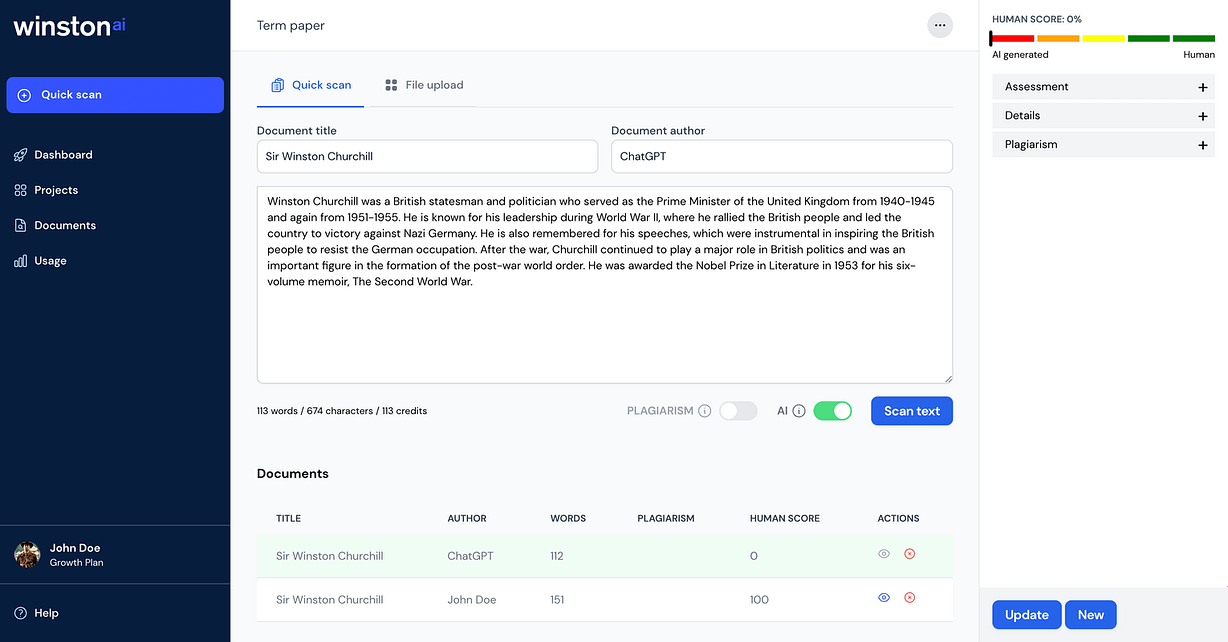Artificial intelligence (ai) is capitalized within the initial two sentences. Ai technology enables machines to perform tasks that typically require human intelligence.
It involves the development of computer systems that can analyze data, make decisions, and solve problems, resulting in intelligent behavior. Ai has become increasingly prevalent in various industries, including healthcare, finance, and marketing. It can transform how we work and live, offering natural language processing, machine learning, and computer vision capabilities.
As ai continues to advance, businesses are leveraging its power to streamline operations, enhance customer experiences, and drive innovation. However, ethical considerations and potential challenges also arise with the widespread adoption of ai.

The Basics Of Capitalization
Artificial intelligence, also known as ai, has become a significant buzzword in recent years. With advancements in technology, ai has made its way into various aspects of our lives, from voice assistants like Siri and Alexa to self-driving cars and personalized recommendations on streaming platforms.
But when it comes to writing about ai, should we capitalize the term or not? In this blog post, we’ll dive into the basics of capitalization and explore whether “artificial intelligence” should be capitalized. Let’s get started with the rules of capitalization.
The Capitalization Of Proper Nouns
Is artificial intelligence capitalized? This is a common question when writing about the fascinating field of ai. In this blog post, we will focus on capitalizing proper nouns, including names of people, places, and organizations.
So, let’s dive in and explore the rules and examples of capitalization in these contexts.
Explanation Of Proper Nouns And Their Capitalization Rules
Proper nouns refer to specific people, places, organizations, or things. Unlike common nouns, proper nouns are capitalized to distinguish them from other generic terms. Here are some key points to remember about capitalization rules for proper nouns:
- Capitalize the first letter of the appropriate noun.
- Capitalize all specific words derived from the proper noun.
- Do not capitalize common nouns or adjectives derived from proper nouns.
Examples Of Capitalization In Names Of People, Places, And Organizations
Now that we understand the basic capitalization rules for proper nouns let’s look at some practical examples:
People:
- Elon Musk: The visionary entrepreneur behind Tesla and SpaceX.
- Marie Curie: Nobel prize-winning scientist who made groundbreaking discoveries in radioactivity.
- Barack Obama: The 44th president of the united states.
Places:
- Silicon Valley: The hub of technological innovation in California.
- Great barrier reef: The most extensive coral reef system in the world, located in Australia.
- Mount Everest: The highest peak in the world, in the Himalayas.
Organizations:
- Google: The multinational technology company known for its search engine.
- United Nations: An international organization promoting peace, cooperation, and development.
- Nasa: The national aeronautics and space administration responsible for space exploration.
These examples demonstrate how proper nouns should be capitalized regardless of their affiliation with artificial intelligence.
Remember, when writing about artificial intelligence, adhering to proper capitalization rules to maintain clarity and professionalism in your content is essential. So, whether you’re discussing ai algorithms or the latest advancements in machine learning, capitalize those proper nouns correctly!
Capitalization In Technical Terminology
Artificial intelligence (ai) has become integral to our everyday lives, revolutionizing industries and paving the way for technological advancements. With its increasing prominence, a common question arises: is artificial intelligence capitalized? Understanding capitalization rules in technical terminology ensures accurate and consistent usage.
Let’s delve into the explanation of capitalization conventions in technical fields.
Explanation Of Capitalization Conventions In Technical Fields
In technical writing, capitalization principles may differ from general language usage. Specific guidelines help us navigate the capitalization of technical terms appropriately. Here are some key points to keep in mind:
- Proper nouns: Names of specific ai systems, tools, or technologies should always be capitalized. For instance, “IBM Watson” is an ai system that analyzes vast data.
- Acronyms: When using acronyms, capitalize all letters. For example, “NLP” stands for natural language processing.
- Titles and headings: In titles and headers, capitalize the first letter of each significant word to enhance readability and clarity.
Examples Of Capitalization In Scientific, Medical, And Technological Terms
To further illustrate capitalization conventions, let’s explore examples from different technical fields:
- Scientific terms:
- “DNA sequencing” refers to determining a DNA molecule’s precise order of nucleotides.
- “photosynthesis” represents the physiological process by which green plants convert sunlight into chemical energy.
- Medical terms:
- “magnetic resonance imaging (MRI)” is a medical imaging technique that uses magnetic fields and radio waves to obtain detailed images of the body’s internal structures.
- “type 2 diabetes” is a chronic condition characterized by the body’s inability to properly regulate blood sugar levels.
- Technological terms:
- “Internet of Things (IoT)” encompasses connecting various devices through the internet, enabling data sharing and automation.
- “augmented reality (ar)” overlays digital information onto the real world, enhancing the user’s perception and interaction.
Understanding capitalization conventions in technical fields ensures accurate usage and enhances clarity and comprehension. By adhering to these guidelines, we can effectively communicate and navigate the evolving landscape of artificial intelligence and its related terminologies.
Appropriate capitalization is vital in maintaining consistency and credibility in technical writing.
Capitalization Of Titles And Headings
Capitalization Rules For Titles And Headings
In the writing world, one common question is how to appropriately capitalize titles and headings. This is particularly important in academic, professional, and creative writing, as it impacts the overall look of the content and reflects a sense of professionalism and attention to detail.
So let’s dive into the critical points of capitalization rules for titles and headings:
Regarding titles and headings, following specific capitalization rules to ensure consistency and clarity throughout your writing is essential. Here are some critical guidelines to keep in mind:
- Capitalize all significant words: In titles and headings, capitalize all practical terms, including nouns, pronouns, verbs, adjectives, and adverbs. This helps to distinguish important words and provide a clear structure to your content.
- Don’t capitalize articles, prepositions, and conjunctions: Articles (a, an, the), prepositions (at, in, on), and meetings (and, but, or) should not be capitalized unless they are the first or last word of the title or subtitle.
- Capitalize proper nouns: Proper nouns, such as names of people, places, organizations, and specific references, should be capitalized in titles and headings.
- Hyphenated words and compound words: Capitalize the first letter of each significant word in hyphenated words or compound words.
To summarize, follow these capitalization rules when crafting titles and headings in your writing:
- Capitalize all significant words.
- Do not capitalize articles, prepositions, and conjunctions unless they are the first or last word.
- Capitalize proper nouns.
- Capitalize the first letter of each significant word in hyphenated or compound words.
Remember, consistency is vital when applying capitalization rules to titles and headings. By following these guidelines, you can ensure your writing appears polished and professional.
Capitalization In Artificial Intelligence Terminology
Artificial intelligence (ai) has become an integral part of our everyday lives, revolutionizing various industries and transforming how we live and work. One common question is whether “artificial intelligence” should be capitalized. This blog post will delve into the capitalization conventions in artificial intelligence terminology.
Explanation Of Capitalization In The Field Of Artificial Intelligence
In the realm of artificial intelligence (ai), capitalization rules can be a bit complex. To help clarify this, let’s explore the key points regarding capitalization in ai terminologies:
- Capitalizing “artificial intelligence”: The term “artificial intelligence” is typically capitalized when it refers to the general concept or field of ai as a whole. It is used as a proper noun to denote the broader domain of intelligent machines and systems.
- Lowercase “artificial intelligence”: On the other hand, when referring to artificial intelligence in a more general or generic sense, such as specific technologies or techniques, it is appropriate to use lowercase letters. Examples include machine learning, deep learning, natural language processing, and computer vision.
- Capitalizing specific technologies: Specific technologies or systems given unique names or acronyms are typically capitalized. For instance, IBM’s Watson, amazon’s Alexa, and Apple’s Siri are capitalized due to their specific branding.
- Case-sensitive industry standards: It is important to note that some specific industries or fields within ai may have established their own capitalization conventions for particular terminologies. When writing in those domains, adhering to industry-specific guidelines is essential.
Whether a term in artificial intelligence should be capitalized depends on its context and usage. It is essential to be mindful of these conventions to ensure clarity and consistency in written content. By following the proper capitalization rules, we can effectively communicate our ideas and convey the intended meaning within the fascinating realm of artificial intelligence.
Capitalization Of Artificial Intelligence Systems And Products
Artificial intelligence (ai) has become integral to our daily lives, transforming how we interact with technology. But when it comes to the capitalization of ai systems and products, things can get a little confusing. Should “artificial intelligence” be capitalized?
Should we capitalize specific ai systems and product names? This section will examine the capitalization conventions for ai systems and products to clarify this matter.
Examination Of Capitalization Conventions For Ai Systems And Products
When it comes to capitalizing ai systems and products, there are a few key points to consider:
- Capitalize proper nouns: Just like any other proper noun, the names of specific ai systems and products should be capitalized. This includes the official names given to ai technologies or particular products in the market.
- Uncapitalized generic terms: Generic terms used to describe artificial intelligence as a concept or field of study, such as “artificial intelligence,” “machine learning,” or “natural language processing,” are typically not capitalized. These terms are considered general descriptors rather than specific entities.
- Capitalize acronyms: If an air system or product name is an acronym, it should be capitalized accordingly. However, it may transition to lowercase if the name becomes widely recognized as a common noun (e.g., laser, radar).
Examples Of Capitalized And Uncapitalized Ai System And Product Names
To provide a better understanding, let’s take a look at some examples of both capitalized and uncapitalized ai systems and product names:
- Capitalized examples:
- IBM Watson: A well-known ai system and product developed by IBM.
- Alexa: The virtual assistant developed by Amazon.
- Siri: Apple’s virtual assistant found on various products.
- Uncapitalized examples:
- Artificial intelligence: A general term used to describe the broader field of ai.
- Machine learning: A subset of ai that focuses on algorithms and statistical models.
- Natural language processing: The ability of a computer system to understand and respond to human language.
Capitalization conventions may vary depending on the context or style guide. It’s always best to consult the guidelines or official naming conventions provided by the respective ai system or product’s creators.
The capitalization of ai systems and products follows standard grammatical rules. Proper nouns, such as specific ai systems and product names, should be capitalized, while generic terms that describe the broader field of ai are typically not capitalized. By adhering to these guidelines, we can ensure consistent and clear communication when discussing artificial intelligence.
Style Guides On Artificial Intelligence Capitalization
Artificial intelligence (ai) has become integral to our lives, ranging from voice assistants like Alexa to self-driving cars. With its increasing prominence, it’s essential to understand the nuances of grammar and capitalization when referring to ai. One question often arises is whether “artificial intelligence” should be capitalized.
To shed light on this matter, let’s explore the style guide recommendations on artificial intelligence capitalization.
Overview Of Style Guides’ Recommendations On Capitalization In Ai
- The associated press (ap) style guide suggests that “artificial intelligence” should be written in lowercase, with no capitalization unless it is the beginning of a sentence or part of a proper noun.
- The Chicago Manual of Style (cms) offers a similar approach, stating that “artificial intelligence” should be written in lowercase, except when it is the first word of a sentence, part of a proper noun, or used in titles and headings.
- On the other hand, the American psychological association (APA) advocates capitalizing “artificial intelligence” in all instances, regardless of the sentence’s context or use in a proper noun.
Comparison Of Different Style Guides’ Approaches
- Ap and cms style guides align in suggesting lowercase usage of “artificial intelligence” in most cases, whereas apa recommends capitalizing it at all times.
- Both ap and cms allow for capitalizing “artificial intelligence” when starting a sentence or forming part of a proper noun. Apa enforces capitalization irrespective of sentence position or noun usage.
- Ap and cms style guides prioritize contextual flexibility, adjusting capitalization for short phrases and titles. Apa, however, maintains consistency and capitalizes “artificial intelligence” consistently.
These style guide recommendations reflect the varying preferences in language usage and capitalization conventions within the industry. While the app and cms styles offer flexibility, adhering to the APA guidelines ensures a consistently capitalized form of “artificial intelligence” across different contexts.
Ultimately, the choice of capitalization may depend on the specific style guide you follow or the preferences of your target audience.
Remember to consult the relevant style guide to adhere to the correct capitalization rules for your writing. Now that we have explored the style guides’ perspectives on capitalization in ai let’s dive deeper into each guide’s approach and understand the rationale behind their recommendations.
The Debate On Capitalization In Artificial Intelligence
Artificial intelligence (ai) has become a buzzword in recent years, revolutionizing industries and transforming how we live and work. However, a debate rages on over the capitalization of this powerful technology. In this section, we will delve into the arguments for and against capitalization in ai and analyze its impact on the perception and understanding of this cutting-edge field.
Discussion Of The Arguments For And Against Capitalization In Ai
- Proponents of capitalizing ai argue that it is a proper noun, just like other technological advancements such as the internet or virtual reality. Capitalizing on ai gives it the recognition and significance it deserves as a distinct and complex field of study.
- Capitalization also helps differentiate between the concept of ai as whole and individual implementations or instances of artificial intelligence. It clarifies that ai is not limited to specific technologies but encompasses a broader scope.
- On the other hand, opponents of capitalization argue that ai is a general term encompassing a wide range of technologies and applications. Thus, it should be treated as a common noun, following standard grammatical rules. This approach prevents potential confusion or ambiguity from capitalizing on a broad and evolving concept.
- Opponents also believe capitalization may inadvertently create a sense of mystique or exaggerated importance around ai. By treating it as a common noun, it is placed in the same category as other technological advancements, emphasizing its practicality and downplaying any potential hype.
Analysis Of The Impact Of Capitalization On The Perception And Understanding Of Ai
Capitalization plays a crucial role in shaping how we perceive and understand ai. Here’s an analysis of its impact:
- Capitalizing on ai can contribute to the perception that it is a groundbreaking and transformative force that warrants significant attention and investment. This can foster enthusiasm and drive advancements in the field.
- However, it is essential to balance highlighting the importance of ai and avoiding inflated expectations or misconceptions. Non-capitalizing ai focuses on the practical applications, technical aspects, and potential limitations, grounding the understanding of ai in reality.
- Overall, the choice of capitalization can influence the public’s perception of ai, shaping how they approach and engage with the technology. It is crucial for communication and education efforts to align with the chosen approach to ensure a clear understanding of ai’s capabilities and limitations.
The debate on capitalization in ai continues to spark discussions among experts and enthusiasts. While capitalization may confer importance and recognition, there are also valid arguments against capitalizing ai. Understanding the impact of capitalization on the perception of ai can help us navigate this dynamic field more effectively, setting realistic expectations and promoting informed discourse.
Read more:
Frequently Asked Questions Of, Is Artificial Intelligence Capitalized
Is Artificial Intelligence Capitalized?
Yes, “artificial intelligence” is capitalized because it is a proper noun referring to a specific field of study and technology.
Conclusion
Whether artificial intelligence should be capitalized boils down to consistency and context. While there may not be a definitive answer, it is essential to follow the guidelines provided by the appropriate style or brand guidelines.
The choice between capitalization or lowercase may also depend on the specific usage and intended audience. However, it is crucial to note that consistency is critical, ensuring that the term is consistently capitalized or lowercase throughout the document or publication.
By adhering to these guidelines, we can maintain clarity and professionalism in our writing while avoiding confusion or inconsistency. Ultimately, the decision on capitalizing artificial intelligence lies in the hands of the writer or publication, but it is essential to remain consistent for effective communication and maintaining brand identity.



